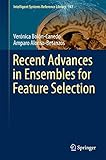Recent Advances in Ensembles for Feature Selection [electronic resource] / by Verónica Bolón-Canedo, Amparo Alonso-Betanzos.
By: Bolón-Canedo, Verónica [author.] .
.
Contributor(s): Alonso-Betanzos, Amparo [author.] | SpringerLink (Online service)
| SpringerLink (Online service) .
.
Material type:  BookSeries: Intelligent Systems Reference Library: 147Publisher: Cham : Springer International Publishing : Imprint: Springer, 2018Edition: 1st ed. 2018.Description: XIV, 205 p. 39 illus., 36 illus. in color. online resource.Content type: text Media type: computer Carrier type: online resourceISBN: 9783319900803.Subject(s): Computational intelligence
BookSeries: Intelligent Systems Reference Library: 147Publisher: Cham : Springer International Publishing : Imprint: Springer, 2018Edition: 1st ed. 2018.Description: XIV, 205 p. 39 illus., 36 illus. in color. online resource.Content type: text Media type: computer Carrier type: online resourceISBN: 9783319900803.Subject(s): Computational intelligenceBasic concepts -- Feature selection -- Foundations of ensemble learning -- Ensembles for feature selection -- Combination of outputs -- Evaluation of ensembles for feature selection -- Other ensemble approaches -- Applications of ensembles versus traditional approaches: experimental results -- Software tools -- Emerging Challenges. .
This book offers a comprehensive overview of ensemble learning in the field of feature selection (FS), which consists of combining the output of multiple methods to obtain better results than any single method. It reviews various techniques for combining partial results, measuring diversity and evaluating ensemble performance. With the advent of Big Data, feature selection (FS) has become more necessary than ever to achieve dimensionality reduction. With so many methods available, it is difficult to choose the most appropriate one for a given setting, thus making the ensemble paradigm an interesting alternative. The authors first focus on the foundations of ensemble learning and classical approaches, before diving into the specific aspects of ensembles for FS, such as combining partial results, measuring diversity and evaluating ensemble performance. Lastly, the book shows examples of successful applications of ensembles for FS and introduces the new challenges that researchers now face. As such, the book offers a valuable guide for all practitioners, researchers and graduate students in the areas of machine learning and data mining. .


There are no comments for this item.